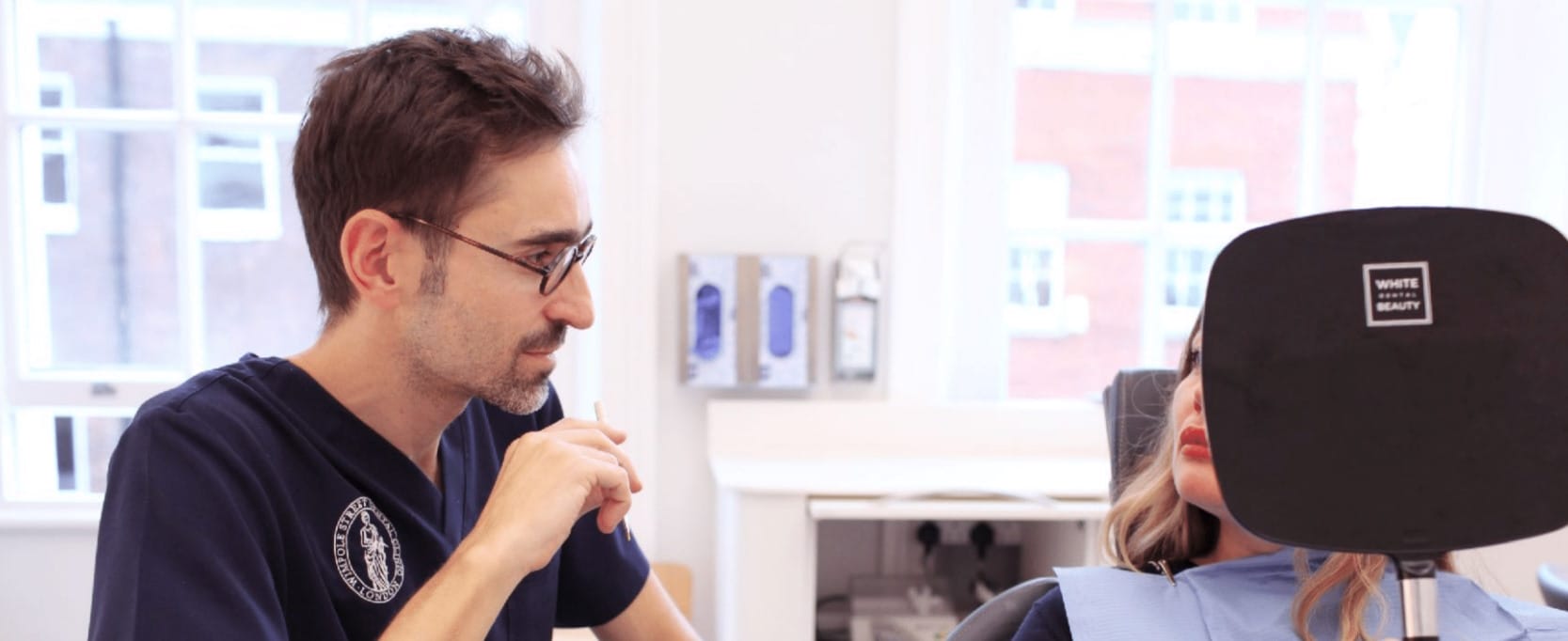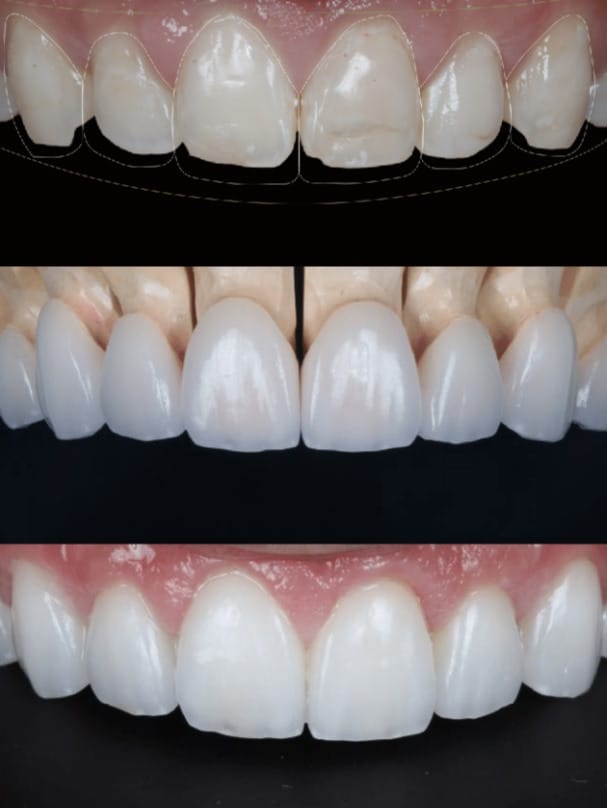Veneers in London
Veneers are a fantastic restorative and cosmetic treatment at our clinic in London. They can protect your teeth whilst also spectacularly improve the appearance of your smile.

Treatment
1 – 6 hours

Price
From £1,700

Team Experience
1,000+ veneers placed

Recovery Time
24 hours

Google Rating
★★★★★ (4.9)
Examples of our work
Veneers offer a versatile solution for transforming the appearance of a smile, from addressing discoloration to refining shape and alignment. At Wimpole Street Dental Clinic, our veneers case studies showcase the artistry and precision we bring to each patient’s treatment, achieving stunning, natural-looking results. Each case reflects our commitment to creating beautiful, long-lasting smiles that enhance confidence and highlight individual beauty.

What are Veneers?
Veneers are masterfully crafted, very thin porcelain surfaces that can be permanently bonded to the teeth, protecting them, changing their shape and improving their colour. When done properly, with good case selection, microscopic attention to detail and with the help of a brilliant ceramist, they cause no damage and look naturally incredible. They can also last for decades, virtually unchanged. The materials commonly used by us are feldspathic porcelain and lithium disilicate.
Who is suitable?
Teeth can become unsightly and with an aged appearance due to discoloured restorations, wear and chips. Some teeth simply have irregular shapes, contributing to gaps, or have become severely discoloured. Porcelain veneers can efficiently cover these defects, restoring the appearance of a healthy, young, beautiful dentition without invasion. They also contribute to improved function and will protect weakened teeth. Overall, the ideal case for veneers is when teeth have the need of a small increase in volume and/or height.

What is the difference between crowns and veneers?
The dental crowns we produce are ceramic caps designed to restore an extensively damaged tooth by covering all its visible parts. A veneer is a very thin (0.3-0.7mm) layer of ceramic material which is designed to cover only the front of the tooth surface, restoring it to its original shape. Both can be highly aesthetic, but crowns require more tooth preparation and, therefore, are less conservative. Sometimes veneers do not require preparation at all, fitting on a tooth like a contact lens.
Do veneers stain?
Not in a permanent way, and that’s their beauty. The margin between a veneer and the tooth surface can, however, become stained. To prevent that from happening, patients should have impeccable oral hygiene and avoid certain foods and drinks such as tea, red wine and turmeric. Gum disease could result in gum recession, which in turn exposes the margins of the ceramic work. Regular checkups and professional cleaning, good oral hygiene practice and staying away from smoking will ensure healthy gums.
Experts in Veneers – meet the team
- Over 75 years of combined experience in dentistry among our specialists.
- More than 10,000 dental treatments successfully performed.
- Industry leaders in dentistry, with regular international teaching, lecturing, and publishing of research.
Our Expertise
We believe that any dental treatment carries a huge responsibility and that every patient deserves the best possible treatment, always, without any compromise in quality and safety. That is why our dentists have the right experience and training in cosmetic dentistry, but also have the ability to listen and understand what your goals are.
It takes a special kind of dentist, one who is almost obsessed with perfection and who has thousands of hours of aesthetic observation, to be able to deliver veneers that will achieve the smile you were looking for.
Poor diagnosis, rushing steps, and working with average laboratories will result in veneers that look unnatural and that will likely cause gum inflammation. We, of course, are on the opposite spectrum of this and have as our ultimate goal to provide veneers that look stunning and yet so seamlessly natural.

Helen Li
Wimpole Street Dental has the highest most ethical standard of work, personable approach, clear and safe procedures, top notch excellence and reliability in treatment provided with utmost professionalism from crème de la crème world class specialists all under one roof.
The porcelain veneer process at Wimpole Street Dental Clinic:
If you think you’d be interested in improving your smile, four main steps are needed: 1) check-up/hygiene/impressions; 2) mock-up/approval of the project; 3) preparation and impressions; 4) veneer fit. Let’s look at it in more detail:
Step 1 – the dentist will examine your teeth, photograph and document the case extensively and ensure that veneers can be indicated. We will also ensure that there aren’t any underlying dental problems. Impressions (digital or conventional) could be taken at this stage in order to create a wax-up (idealised teeth model) so that you can see, with a high degree of precision, what the final result would look like.
Step 2 – In a very simple and reversible procedure, the dentist could transfer the wax up onto your teeth. We call this a mockup, and it will give you an exact idea of what the final outcome would be. It allows the patients to approve the project without any concerns.
Step 3 – This step consists of performing minimal to no preparation of the enamel of the teeth. High magnification, preparation guides and utmost respect for the teeth’s biology will ensure no harm will be done. At the end of this appointment, the dentist will fabricate temporary veneers, which will also look very similar to the final ones.
Step 4 – Veneerfit. This appointment usually takes place 3 weeks later, which is the time needed for a world-class technician to craft the porcelain veneers. After your approval, the restorations will be bonded to your teeth with microscopic precision.





Updated content
Written by: Dr Raul Costa
Medically reviewed by: Prof Dr Christian Mehl
Updated content to include new patient story & frequently asked questions
Written by: Prof Dr Christian Mehl
Medically reviewed by: Dr Raul Costa
New page design
Written by: Prof Dr Christian Mehl
Medically reviewed by: Dr Raul Costa
Author biography added
Written by: Prof Dr Christian Mehl
Medically reviewed by: Dr Raul Costa
Original content created
Written by: Prof Dr Christian Mehl
Medically reviewed by: Dr Raul Costa
Wimpole St Dental Clinic has strict sourcing guidelines and relies on peer-reviewed studies, academic research institutions, and medical associations. We avoid using tertiary references. You can learn more about how we ensure our content is accurate and current by reading our editorial policy.
- Fahl N Jr,, Ritter AV. Composite veneers: The direct-indirect technique revisited. J Esthet Restor Dent. 2021 Jan;33(1):7-19. doi: 10.1111/jerd.12696. Epub 2020 Dec 18. PMID: 33336852.
- Gresnigt MMM, Sugii MM, Johanns KBFW, van der Made SAM. Comparison of conventional ceramic laminate veneers, partial laminate veneers and direct composite resin restorations in fracture strength after aging. J Mech Behav Biomed Mater. 2021 Feb;114:104172. doi: 10.1016/j.jmbbm.2020.104172. Epub 2020 Nov 4. PMID: 33172798.
- Farias-Neto A, de Medeiros FCD, Vilanova L, Simonetti Chaves M, Freire Batista de Araújo JJ. Tooth preparation for ceramic veneers: when less is more. Int J Esthet Dent. 2019;14(2):156-164. PMID: 31061996.
- Korkut B. Smile makeover with direct composite veneers: A two-year follow-up report. J Dent Res Dent Clin Dent Prospects. 2018 Spring;12(2):146-151. doi: 10.15171/joddd.2018.023. Epub 2018 Jun 20. PMID: 30087767; PMCID: PMC6076883.


















